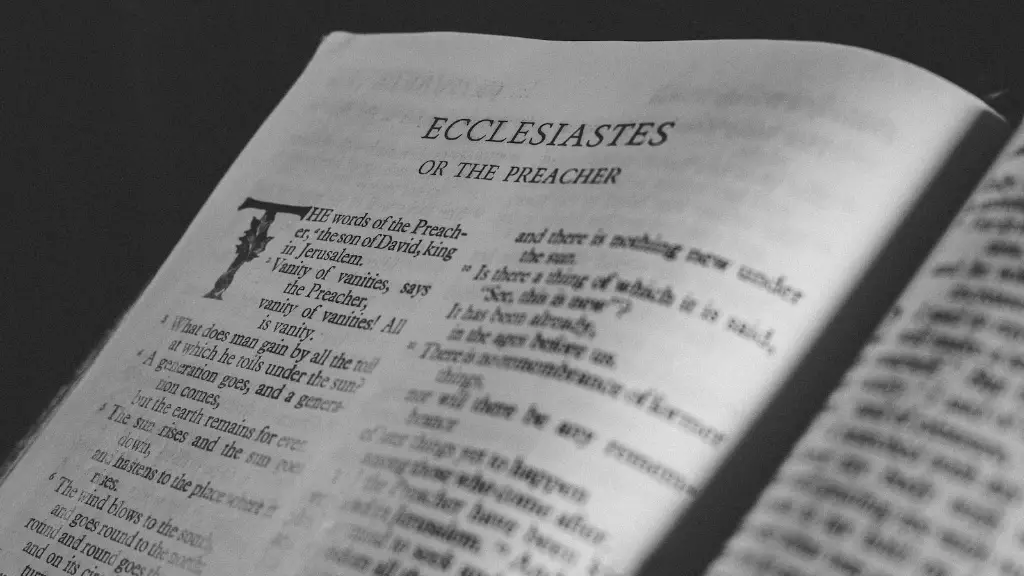Is The Bible A Fairytale? Can it be taken as an absolute truth? This has been an ongoing discussion within all corners of the world and has been debated, studied, changed and challenged multiple times in history.
The Bible has been seen by most as the divinely revealed word from God with a variety of interpretations applied. As a result, there have been vast disagreements between believers and skeptics alike in regards to its authenticity. To those who believe the Bible, it is the ultimate source of truth and knowledge without fail. To skeptics, the Bible may be seen as little more than a collection of fables and tales meant to impart moral lessons though not necessarily factually correct.
The ancient origin of the Bible is a primary source of contention. It is composed of 66 distinct books written at various points in time by multiple authors, some of which may or may not be historically accurate depending on who is asked. It’s range of topics, which deal with law, history and morality, tend to allude to an historical basis but ultimately that has not been confirmed.
Thus, establishing a timeline of the Bible is almost impossible. It has changes and revisions throughout time, and often is dependent on who was in control at points in time. It can be assumed that many events occurred in the way described in the Bible, yet there’s no way to verifying that with absolute certainty.
In addition, some argue that scientific evidence does not support the Bible’s description of the world’s origin and its overall structure. This has brought about an even greater divide between believers and skeptics, and has caused shifts in interpretation from those whose faith is unwavering versus those that are more analytical.
Finally, it cannot be denied that in addition to being a source of moral guidance, the Bible is also a religious symbol. It is used as a tool to invoke comfort, to observe faith, and to honor its teachings. Many see it as a means to achieve salvation and inner peace, granted that it be observed as the infallible truth.
Historical Significance
The Bible carries a long and impressive history that’s often been inextricably linked to the events of the past. It has been used to justify or oppose religious and political decisions, it has been quoted while giving speeches, and it has been endlessly fought over in heated debates. Even today, the legacy of the Bible is inextricable from many activities, as it is often used in religious ceremonies for example.
The ancient origins of the Bible add to its potential of credibility as a source of eternal truth. Whether it be a historically accurate or not, the age of the text lends support to its use as a means of obtaining religious and moral guidance.
In addition to its iconic status, some consider the Bible as an encyclopedia of sorts. It contains information on language, customs and traditions that have long since been forgotten. To this day, it remains invaluable as an archaeology resource and those in search of knowledge use the Bible to gain greater insights into the past.
Moreover, the Bible has acted as a consoling force for those in need of comfort and guidance. To believers, it is written documentation of faith and for those who are seeking peace through meditation, the Bible offers an abundance of literary products that can be used as a means to prayer.
Cultural Significance
The purported origin of the Bible can also be seen as a vehicle for its interpretation. It is widely believed to be the word of God, but many don’t understand what this means. To put it simply, the Bible is ultimately a product of the culture in which it exists.
This is to say that cultural beliefs will influence the either acceptance or rejection of the Bible. Its stories and its legends are sometimes seen as exemplary examples of how to act, or else they are seen as irrelevant tales, depending on who is listening.
In addition, cultural tradition may dictate how the Bible is interpreted and, as a result, might cause conflicting opinions amongst adherents and opponents alike. No matter the cultural background, everyone will have their own personal view on what the true significance of the Bible is.
Furthermore, the Bible may be seen as a tool of expression. Its stories and its mythology have been used time and time again to promote certain ideas and to express particular points of view. In this sense, the Bible may be considered a fantastic collection of literature, literature that has gone on to influence many aspects of culture.
Finally, it is safe to say that the Bible has been a significant source of inspiration for many throughout the years. It has been used as a real life guide and has acted as a beacon of faith to them.
Academic Significance
When it comes to the academic argument over the Bible, opinions vary drastically. Some see it as a compilation of fact-based records while others see it as a collection of legends and myths.
Those that agree with the first opinion believe that the Bible can and should be used as a source of historical reference. They often use it as a scholarly source to make determinations based on events that allegedly happened in the past.
Receiving its due respect as an ancient record, others are more skeptical of its reliability and view it as an unreliable source of information. To them, the literature presented in the Bible cannot be taken as an absolute truth, but should be subjected to the same standards of evidence that any other document of its age would.
There are also those who believe that the Bible is too archaic and too subjective to be used as an academic tool. They argue that the language is outdated, the stories are told in snippets and quotations, and the interpretations can vary greatly depending on who’s reading it.
At the end of the day, what the Bible can be used for academically depends on who you ask.
Spiritual Significance
For many, the spiritual significance of the Bible is undeniable. Seen as a source of life, it is interpreted as a positive source of faith and hope, and is used as a coping mechanism during dark times.
Moreover, some cite the Bible as a source of mindfulness and inner discipline, and use its teachings as a method to achieve both mental and spiritual clarity. Its stories are often quoted in moments of struggle or as a way to encourage positive thoughts and emotions.
At the same time, many believe that the Bible can be used as a tool for repentance, for redemption, and for healing. Its use for this purpose is cited by many who have claimed to have gone through difficult periods in their lives and have used the Bible to bring them back from the edge.
Much like the academic argument, the spiritual argument over the Bible has many sides. To those that use it as a way to better their lives, it can be seen as a powerful force for good and may be used as a real-life guide.
For those that are less in favor of its use, the Bible may be considered a source of superstitious dogma with no real meaning or importance.
Conclusion
The discussion over the Bible and its significance can be endless. What’s important to realize is that regardless of one’s opinion, the Bible holds an important place in the history of mankind, has gone on to influence countless individuals and has maintained its relevance to the present.
Regardless of who you ask and what perspective you bear, one thing is clear: the debate over the Bible will continue for years to come, and the various opinions and interpretations that come with it will keep it one of the most discussed and talked about topics of all time.





